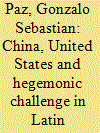|
|
|
Sort Order |
|
|
|
Items / Page
|
|
|
|
|
|
|
| Srl | Item |
| 1 |
ID:
112500


|
|
|
|
|
| Publication |
2012.
|
| Summary/Abstract |
Has China been a hegemonic challenge to the United States in Latin America in recent years? The article explores this question by setting a comparison with historical cases of instances of hegemonic challenge in Latin America, searching for similarities and differences, and looking for makers of rivalry as a way to start to distinguish perception from reality. I stress the instrumentality of framing issues, since they serve for internal mobilization and for control of allies. The article also attempts to illuminate the issue of how the United States has reacted to China's growing presence in an area historically considered within its sphere of interests, or "backyard," and about the dialogue between the United States and China about the region. It provides insights on the United States, China and Latin American countries' policy makers' thinking, collected through off-the- record interviews and closed-door debriefings.
|
|
|
|
|
|
|
|
|
|
|
|
|
|
|
|
| 2 |
ID:
091018


|
|
|
|
|
| Publication |
2009.
|
| Summary/Abstract |
Providing an overview of the emergence, characteristics, trajectory, and potential limitations of the transnational anti-base network, this article focuses on two broad questions relevant to transnational politics. First, what processes and mechanisms enabled local and transnational activists to form the international No Bases network? Second, how did activists juxtapose existing local anti-base identity and frames to emerging transnational ones? Following existing transnational movement theories, I argue that the global anti-base network slowly emerged through processes of diffusion and scale shift in its early stages. The onset of the Iraq War, however, injected new life into the transnational anti-base movement, eventually leading to the inaugural International Conference for the Abolition of Foreign Bases in 2007. Although loose transnational ties existed among anti-base activists prior to 2003, the U.S. war in Iraq presented anti-base activists the global frames necessary to accelerate the pace of diffusion, scale-shift, and brokerage, and hence, the consolidation of a transnational anti-base network. Paradoxically, however, even as No Bases leaders attempted to forge a new transnational identity, anti-base activists, as "rooted cosmopolitans," continued to anchor their struggle in local initiatives.
|
|
|
|
|
|
|
|
|
|
|
|
|
|
|
|
|
|
|
|
|